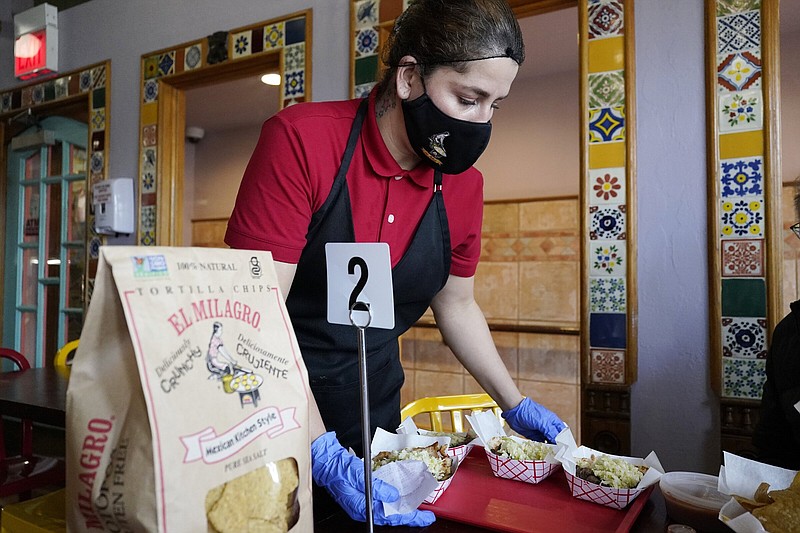Chicago became the largest U.S. city to independently phase out the subminimum wage for tipped workers on Friday, a step that celebrity chef Rick Bayless said the city needed to take "for the greater good."
Bayless supported the legislation, which passed by a vote of 36-10, but not without reservations.
He worries it could deepen the pay disparity between well-paid front-of-house workers who will be getting raises and their counterparts in the kitchen, who have always taken home less money because they don't collect tips.
An alarm raised by restaurant owners about the effects that higher labor costs will have on their bottom lines and on menu prices is not just noise, said Bayless, whose Chicago restaurants include Frontera Grill and Topolobampo. "A lot of people look at [the] restaurant world and say, 'Well, just pay them more,'" Bayless said. "But it is a zero sum game."
Still, the chef, who implemented a service fee in his full-service Chicago restaurants during summer 2020 and now pays servers at Frontera and Topolobampo at least $25 an hour, said the phaseout is necessary. While servers at high-end downtown restaurants can make a lucrative living off of tips, he said, many waitstaff at smaller neighborhood restaurants are just getting by.
"We have to ensure that everybody who's waiting tables in all the restaurants, no matter whether they're high-profile or your local diner," he said, "that they're being taken care of."
Under existing law, Chicago bars and restaurants can pay tipped workers, such as servers and bartenders, $9.48 an hour, 60% of the full minimum wage of $15.80. If workers' gratuities do not float their hourly wages above the full minimum wage, restaurants are required to make up the difference, although advocates argue that doesn't always happen.
Under the new law, the gap between the tipped and full minimum wages will shrink 8% each year until the tipped and full minimum wages reach parity in 2028.
Supporters of the legislation say that working for tips keeps restaurant workers' wages unpredictable and leaves them vulnerable to customer harassment and racial biases. Opponents, including the Illinois Restaurant Association, say the measure will cause restaurants skating by on already notoriously thin margins to cut staff, raise menu prices and close down.
An earlier version of the proposal would have phased out the subminimum wage over two years instead of five; in a statement, the restaurant association referred to the final deal as a "compromise we can accept."
One Fair Wage, a nonprofit organization advocating to eliminate the subminimum wage around the country, estimates about 100,000 tipped workers in Chicago will be affected. The restaurant association estimates that there are more than 7,000 food service providers, including bars and restaurants, across the city. The question moving forward will be what effect the new measure has on their bottom lines.
"I just don't want to be the guinea pig," said Alexis Pavlatos, an attorney who moonlights as a bartender on busy Friday and Saturday nights at Good Night John Boy in the West Loop and Benchmark Chicago in Old Town. Pavlatos said she often makes around $60 an hour, the vast majority of which is made up of tips, and hopes patrons won't tip less as a result of the legislation. If her tips go down significantly, Pavlatos said, she may stop bartending. "I'm just a little bit nervous," she said.
"We're talking about a portion of the population that generally works for lower wages in an industry that generally does not provide things like health insurance, paid vacation, sick days, lots of other perks that almost every other industry does provide for their employees," said Will Stahl, a veteran bartender who supported the legislation.
Eliminating the subminimum wage, Stahl said, was the ethically correct thing to do.
Some restaurant owners, reeling from years of pandemic pain, say it's not so simple.
"The legislation purports to help tipped workers, but it's not, because it's putting the restaurants they work at at risk," said Michelle Durpetti, managing partner of Gene & Georgetti in River North. Durpetti estimated that paying the full minimum wage could cost the steakhouse upward of $250,000 a year, and said everything is on the table: raising menu prices, implementing a service fee and even closing.
"This is going to force restaurants to dramatically cut costs or raise prices. Everything is going to have drama to it," she said.
"Restaurants have been falsely inexpensive for a really long time," said Zoe Schor, chef and owner at Split-Rail in Ukrainian Village, who supports removing the subminimum wage. Diners at Split-Rail pay a 20% service fee that goes to hourly wages for staff, which start at $18 an hour, as well as benefits such as health care for full-time employees. Split-Rail also offers paid vacation time and a 401(k) match for staff who've worked there more than a year.
"As a very small, very scrappy independent restaurant owner I will say simply if you can't figure out how to pay people a living wage and stay open, then maybe you can't stay open," Schor said.
